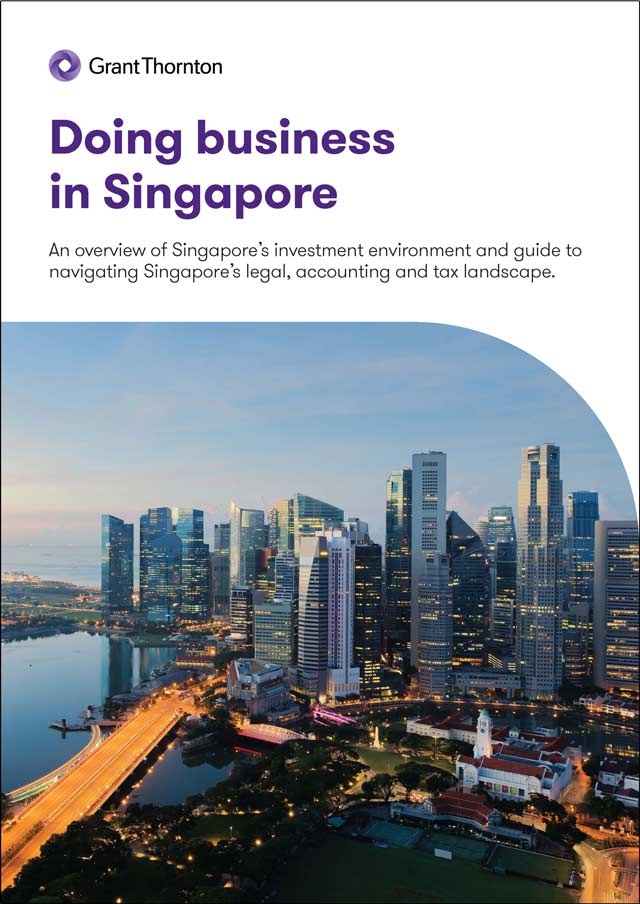
Transfer pricing in Singapore

All related party transactions must:
- Be conducted at arm’s length, regardless of the transaction value; and
- Comply with the transfer pricing rules and documentation requirements.
Taxpayers are to prepare and keep contemporaneous transfer pricing documentation if they meet any one of the conditions below:
- Gross revenue is greater than SGD 10 million for the basis period concerned; or
- Transfer pricing was required to be prepared for the previous basis period
When to complete documentation:
- By the filing due date of Income Tax Return
Arm's length principle
Transactions between related parties must be conducted at arm’s length, irrespective of the transaction value.
The IRAS is empowered to make transfer pricing (TP) adjustments on related party transactions that deviate from what would be expected between independent parties under comparable circumstances.
Unless specific conditions are met, a 5% surcharge will be imposed on any TP adjustment made by IRAS or on a self-initiated adjustment voluntarily disclosed by the taxpayer that increases the amount of income, reduces the amount of deduction/allowance, or reduces the amount of loss.
This surcharge is applicable regardless of whether additional tax is payable as a result of the adjustments and must be paid within one month from the issuance of the surcharge notice.
Reporting and documentation
TP documentation
Singapore is renowned for its business-friendly environment. Taxpayers engaged in transactions with related parties are exempt from preparing and maintaining TP documentation if they meet the following two conditions:
- Annual gross revenue from trade or business for the basis period concerned does not exceed SGD 10 million; and
- They were not required to prepare TP documentation for the immediately preceding basis period.
In addition to the above conditions, the administrative burden is further alleviated by the following specific/transaction exemption thresholds:
- Related party domestic transactions (excluding related party loans) that are subject to the same tax rate or are both exempt from tax;
- Related party domestic loans that were entered into before 1 January 2025. Thereafter, the application of IRAS’ indicative margin will be required as part of the qualifying conditions. This condition is not applicable to taxpayers who are engaged in the business of borrowing and lending money;
- Related party loans, each not exceeding SGD 15 million, to which the IRAS’ indicative margin is applied;
- Routine support services on which a 5% mark-up on costs is applied. The legislation lists out the specific services that can be considered “routine support services”;
- Related party transactions covered by an Advanced Pricing Agreement; or
- Related party transactions not exceeding thresholds in the following table:
| Category of related party transactions | Threshold per financial year (SGD) | |
|---|---|---|
| YA 2025 and before | YA 2026 and onwards | |
|
Purchase of goods from related parties
|
15 million
|
15 million
|
|
Sale of goods to related parties
|
15 million
|
15 million
|
|
Loans granted to related parties
|
15 million
|
15 million
|
|
Loans granted from related parties
|
15 million
|
15 million
|
|
All other categories of related party transactions
Examples:
|
1 million per category of transaction on an aggregated basis
|
2 million per category of transaction on an aggregated basis
|
TP documentation must be completed prior to the tax return filing deadline for the YA. The relevant legislation stipulates detailed content requirements for TP documentation, summarised as follows (note that this summary is not exhaustive):
- An overview of the group’s businesses that are relevant to the business operations in Singapore, detailing the group’s global business, organisation structure, the nature of global business operations and overall TP policies.
- Specific details of the taxpayer’s business in Singapore, including descriptions of the business operations, related party transactions, and TP analysis to ascertain whether the conditions made or imposed are in accordance with the arm’s length conditions.
Non-compliance with the requirements can result in a penalty not exceeding SGD 10,000. The following are instances of non-compliance:
- Failing to complete TP documentation by the time of the making of the tax return;
- Not preparing TP documentation based on the content requirements prescribed under the legislation;
- Failing to retain the TP documentation for a period of 5 years;
- Not submitting the TP documentation within 30 days of a written request by the IRAS; or
- Providing any documentation or information that the taxpayer knows to be false or misleading.
It is crucial to recognise that exemption from preparing comprehensive TP documentation does not exempt taxpayers from IRAS scrutiny. IRAS may still request supporting documents to verify the arm’s length nature of related party transactions or to make a TP adjustment.
Consequently, maintaining adequate records is essential to ensure preparedness for any inquiries or audits conducted by the IRAS.
Related party transactions form
Taxpayers with aggregated related party transactions exceeding SGD 15 million within a financial year are required to complete the Related Party Transactions Form, which is an integral part of their corporate income tax return. This form necessitates the disclosure of:
- Types and amounts of related party transactions.
- Names, locations, and relationships of the top five foreign transacting parties, ranked by the value of sales or purchases of goods and services.
- Details of loans and non-operating amounts owed to or by related parties.
Non-compliance with this requirement renders the corporate tax return incomplete. Penalties for failing to meet this obligation may include a fine of up to SGD 5,000 or imprisonment in the case of default on the payment of the fine.

Download the full PDF guide
Contact us



Subscribe for timely technical updates and keep on the pulse with industry developments
Related articles
View more

